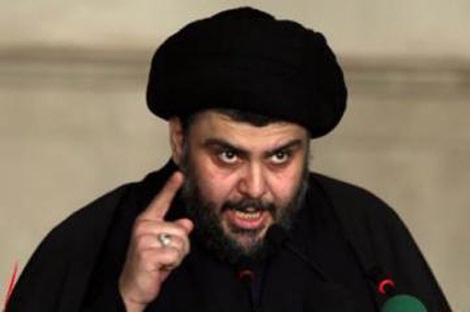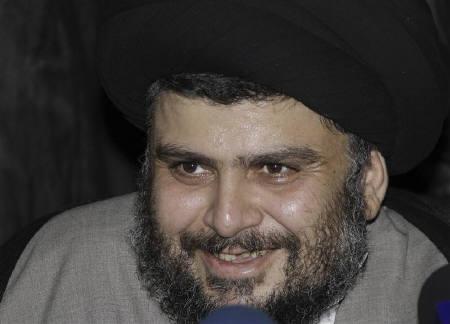Tiny steps forward by Islamic leaders in Pakistan, Iraq
Colin Stewart is a 45-year journalism veteran living in Southern…

Islamic leaders in Iraq and Pakistan have issued statements calling for toleration of some LGBTI people.
Each announcement fell far short of what LGBTI activists know is necessary to achieve fair and equal treatment for LGBTI people, but each represented a shift toward acceptance of at least some members of the LGBTI community.
However, the Pakistani religious group’s position, while favorable to some sexual minorities in Pakistan, also included the harsh claim “Allah clearly says that gays should be killed.”

At about the same time, Iraqi Shiite clergyman Muqtada al-Sadr on June 29 banned the use of violence against gender-non-conforming individuals.
OutRight International commented that “Though Mr. Sadr classifies homosexuals as sick people, his refusal to demand punishment for their ‘sins’ and his acknowledgement of the complexity of this issue can potentially open the doors to a broader debate among Shiite religious scholars about sexual orientation, homosexuality, and the treatment of gays and lesbians in Islam.”
The merciful part of the June 26 Pakistani edict (fatwa) by the head of the religious law organization Tanzeem Ittehad-i-Ummat was somewhat confusing, since it seemed to be based on a misunderstanding of the differences among transgender people, intersex people and Khawaja Sira people, who are sometimes called “third gender” people. The edict stated that Khawaja Sira people could marry, be eligible for inheritance, and have Muslim funerals. It said that parents who deprive Khawaja Sira sons or daughters of inheritances were “inviting the wrath of God.”
In further discussions, the religious group focused on the characteristics of Khawaja Sira people’s genitalia. In contrast, LGBTI-friendly NAZ Pakistan insists that “Khawaja Sira is a culture and NOT a gender.”.
Several media organizations reported the news from Pakistan, including Arynews, the BBC and Katehon.com:
Muhammad Zia Ul Haq Naqshbandi, the Lahore-based head of the Tanzeem Ittehad-i-Ummat religious law organisation that issued the fatwa, said parents who deprived their transgender sons or daughters of inheritances were “inviting the wrath of God”.
Tanzeem Ittehad-i-Ummat is not a political organisation, and its fatwas are not legally binding. But the group is rather influential.
Further investigation by LGBTI-friendly NAZ Pakistan revealed confusion about the issue by news media and Tanzeem Ittehad-i-Ummat. (See details below.)
The group noted:
“Efforts need to be made to bring clarity amongst the general population on the differences between a “eunuch,” transgender (both men and women) and Khawaja Sira. It must be understood by all stakeholders that Khawaja Sira is a culture and NOT a gender.”
NAZ serves the Pakistani trans community and Pakistani men who have sex with men.
IRAQ
Regarding Iraq, OutRight Action International reported:
Powerful Iraqi Clergyman Decries Violence against Gender-non-conformist Individuals

In a groundbreaking religious decree, the controversial Iraqi Shiite clergyman Muqtada Sadr banned the use of violence against gender-non-conformist individuals, arguing that resorting to violence will result in [those individuals’] further alienation from religion.
The historical ruling, dated June 29, 2016, is significant from both religious and political perspectives. Mr. Sadr is a populist clergy man with great following in Iraq, and has been considered a political and military powerhouse in the post-Saddam Iraq. Mr. Sadr was the face of the February 2016 “Million Man March” in Baghdad’s Tahrir Square to protest corruption in Iraq. He has been the leader of Mahdy Army militias (2003-2008), and later the Peace Squadron (Sarāyā al-Salām) that was formed in 2014 to protect Shiites against the Islamic State (ISIS).
Mr. Sadr’s fatwa was not an acceptance of same-sex practice or cross dressing. Rather, the new ruling classifies homosexuals and cross-dressers as individuals “suffering psychologically” and committing sinful acts, but society should respect their right to life, hoping that they will eventually see the light. In doing so, he views the issues of homosexuality and cross dressing from three different perspectives: psychologically, socially, and religiously. This distinction is a departure from the traditional stand of Shiite clerics on this issue, which only relied on a religious doctrine on same-sex practice. Although Mr. Sadr condemns homosexuality on a religious basis, he acknowledges that the social realities cannot be solely judged through a religious lens. Though Mr. Sadr classifies homosexuals as sick people, his refusal to demand punishment for their “sins” and his acknowledgement of the complexity of this issue can potentially open the doors to a broader debate among Shiite religious scholars about sexual orientation, homosexuality, and the treatment of gays and lesbians in Islam.
Beyond Iraq and within the Shiite communities, Mr. Sadr is viewed as a mid-ranking clergyman, whose religious opinion on the treatment of cross-dressers and gay men can encourage his peers and leading Shiite clerics to re-articulate their long-standing views on same-sex practice and gender-non-conformity. Though Muqtada Sadr is not considered to be a religious heavyweight similar to Ayatollah Sistani (the leader of Iraqi Shiites), he is a mainstream Shiite cleric, from a prominent family, with extensive connections within the Shiite cleric circles worldwide.
The new religious decree is binding for the followers of Mr. Sadr, including his militia men, though given the high level of social stigma against gender non-conformist individuals in Iraq, it is not clear how long it will take for Mr. Sadr’s followers to adhere to the new ruling.
PAKISTAN
This is NAZ Pakistan’s report on its meeting with members of Tanzeem Itehad-e-Ummat:
NAZ Pakistan meets Tanzeem Itehad-e-Ummat to discuss the recent Fatwa on marriage equality for Khawaja Siras (hijra)
Lahore, 26 June 2016: Tanzeem Itehad-e-Ummat issued a Fatwa titled, “Nikkah (marriage) of Khawaja Sira is Permissible under the Islamic Law”. The fatwa, which was endorsed by 50 members of the Tanzeem Itehad-e-Ummat, provides clarity on the religious organisation’s interpretation of Islamic values as they relate to the rights of Khawaja Sira persons….or so was thought by the media and the general public.
The fatwa awards “Khawaja Sira” persons the right to marry, be eligible for inheritance, and right of adult as well as infant “Khawaja Sira” persons to have a Muslim funeral and to be buried in a Muslim cemetery. The Fatwa condemns those who humiliate and abuse “Khawaja Sira” persons in public as “these people are disrespecting Allah’s creation.” The fatwa even goes so far as to suggest to prosecute those parents who abandon such children. It also states that “Khawaja Sira” persons are bound to follow the same rules that Allah has prescribed to Muslim men and women; they should refrain from all the prohibited evils and should offer prayers 5 times a day, fast during the month of Ramadan, pay Zakat, offer Haj and follow other Islamic teachings and values.

On 30th June, 2016, at the request of the Executive Director of NAZ Pakistan, Qasim Iqbal, Maulana Muhammad Zia ul Haq Naqshbandi and 8 other members of Tanzeem Itehad-e-Ummat in Lahore had a meeting with NAZ Pakistan. The purpose of the meeting was to understand the terms of the fatwa to clarify any kind of misconception.
Maulana Muhammad Zia ul Haq Naqshbandi made it very clear that the Fatwa is only relevant to intersex persons:
“Our understanding of a Khawaja Sira is what the Koran, Allah and His Prophet has told us. Allah works in mysterious ways and his creations are beautiful. He made man, woman, and then he made Khawaja Sira. Some Khawaja Siras have genitals that are more male, while others have genitals that are more female. And then there are Khawaja Siras whom we call Mukhanas e Mushkil….these are Khawaja Siras who are born with ambiguous genitalia.”
On the issue of persons who identify as transgender, the Maulana said:
“As Muslims it is our duty to follow the teachings of Allah and His Prophet and those people who are born male and yet dress in women’s clothing are going against Allah’s will. That is completely unnatural. These people are gay and Allah clearly says that gays should be killed. These people are fake Khawaja Siras. They dress in women’s attire to seduce men and men do come under their seduction. These seduced men are victims and need religious counseling. These fake Khawaja Siras have intimate relations from the back side, which is haram [forbidden]. There is no Islamic fatwa that can give protection to people who commit sin knowing that it is a sin that they are committing.”
When asked if this Fatwa would also include similar rights for those Khawaja Siras who are castrated:
“Castration is prohibited in Islam. The Koran, in clear words, tells us that we must not alter our bodies. These castrated ones are just gay men who are mentally ill. Why would a sane person castrate any part of his body unless it is for medical reasons.”
When asked why it is that intersex persons whose gender could not be determined (Mukhanas e Mushkil ) were not allowed to marry as per the fatwa that they have issued:
“Mukhanas e Mushkil cannot be allowed to marry because they are neither man nor woman. In Islam there must be sexual relations between the husband and wife for the marriage to be consummated. Since Mukhanas e Mushkil are unable to have sexual relations, it is Allah’s wish that they should remain celibate.”
On asking if the Khawaja Sira people was involved in the development of this fatwa the representatives of the Tanzeem Itehad-e-Ummat stated:
“Prior consultations with Khawaja Siras were not required because Allah and His Prophet have clearly outlined the rights of every human being, including those of Khawaja Siras. Islam considers Khawaja Siras to be Allah’s chosen people as he has awarded them with both genders. One does not need to socialize with a certain population to know that they are being hurt. All of us see Khawaja Siras begging on the streets and that pains us. We worry about what will happen to them in their old age. They cannot have children so who will take care of them. We worry that because they are shunned by society they will turn to criminal activities to support themselves. All human beings should have the right to good nutrition, education, marriage and the right to bear children. “
____________________________________________
NAZ Pakistan welcomes the acknowledgement and the rights awarded to intersex persons in the Fatwa issued by Tanzeem Itehad-e-Ummat. We hope that the Government and other religious organizations of all religions and sects will follow suit. Furthermore, NAZ Pakistan welcomes the support of human rights, including marriage equality, the right to not be discriminated, inheritance rights and right to a Muslim burial of intersex persons that the Fatwa acknowledges. This is the first time that a religious organization in Pakistan has issued a declaration in support of the Intersex persons.
Many people in Pakistan have the misconception that Khawaja Siras are born with ambiguous genitalia. The Fatwa issued by Tanzeem Itehad e Ummat on 26 June, 2016 highlights the confusion between a Khawaja Sira and an intersex persons amongst the general population of Pakistan. The confusion that has resulted from this Fatwa mirrors the 2009 Supreme Court judgement which acknowledged “eunuchs” as equal citizens of Pakistan. Many people interpreted the word “eunuch” as transgender and/or Khawaja Sira.
Efforts need to be made to bring clarity amongst the general population on the differences between a “eunuch,” transgender (both men and women) and Khawaja Sira. It must be understood by all stake holders that Khawaja Sira is a culture and NOT a gender.
NAZ Pakistan strongly disagrees with Tanzeem Itehad e Ummat’s interpretation of the Koran and its teachings as they pertain to transgender and gay identified persons and believes that all institutions, including religious, have an obligation to be accepting of diversity.
Related articles:
- Pakistan’s transgender community cautiously welcomes marriage fatwa (June 2016, BBC)
- The Third Gender People of Pakistan (April 2014, NU Political Review)
- Archive of this blog’s articles about Pakistan


